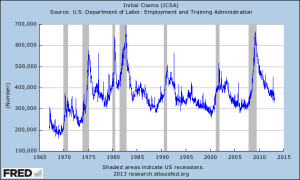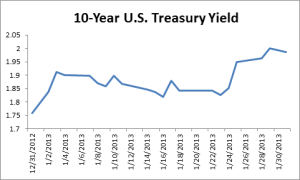The interesting story today is the stock market, as it manages to shrug off the worries from Europe, the sequester, and a power higher. The Dow Jones Industrial Average is closing in on its all-time high, set in October 2007. The S&P 500 Index is not quite—but almost—as close to the high that was set around the same time. Are happy days here again?
The numbers I mention above are a bit misleading, in ways both positive and negative. For both indices, if you include dividends paid over the time since the previous highs, we have already passed them. This would be positive. If you look at the indices adjusted for inflation, however, we are further away, which is negative. The key is that, surpassing the previous levels would just be numbers, with more psychological than economic significance.







